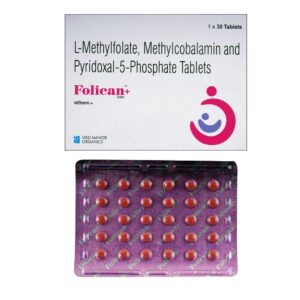METHYCOBALAMIN + L-METHYLFOLATE
Methycobalamin: Methycobalamin is a prescription medication that belongs to the group of drugs known as vitamins. It is a synthetic form of Vitamin B12, which is an essential nutrient required for the proper functioning of the brain, nerves, blood cells, and other vital organs.
The primary use of Methycobalamin is to treat Vitamin B12 deficiency, which can occur due to various factors such as dietary deficiencies, malabsorption disorders, or certain medical conditions that interfere with B12 absorption. It is also prescribed for certain neurological conditions, such as peripheral neuropathy, diabetic neuropathy, and trigeminal neuralgia.
Methycobalamin works by restoring or increasing the levels of Vitamin B12 in the body. It plays a crucial role in the metabolism of proteins, fats, and carbohydrates, as well as the formation of red blood cells. It also helps maintain the myelin sheath, a protective covering around nerves, which is essential for proper nerve function.
The dosage of Methycobalamin may vary depending on the individual’s age, medical condition, and severity of deficiency. It is available in various forms, including oral tablets, sublingual tablets (placed under the tongue), injections, or intranasal sprays. The exact dosage should be determined by a healthcare professional.
Like any medication, Methycobalamin may cause side effects in some individuals. Common side effects include mild diarrhea, nausea, headache, dizziness, or allergic reactions such as itching, rash, or swelling. These side effects are usually temporary and resolve on their own.
In rare cases, more severe side effects may occur, such as chest pain, difficulty breathing, rapid heartbeat, or numbness/tingling in the hands or feet. If any of these side effects are experienced, it is important to seek immediate medical attention.
It is worth noting that Methycobalamin is generally considered safe when used as directed by a healthcare professional. However, it is always advisable to consult a doctor or pharmacist before starting any new medication to ensure it is appropriate for your individual needs and to minimize the risk of potential side effects.
L-Methylfolate: L-Methylfolate, also known as levomefolic acid or 5-MTHF, is a prescription medication that is used to treat certain medical conditions related to folate deficiency. Folate is a type of B vitamin that is essential for the production of DNA, RNA, and red blood cells in the body.
L-Methylfolate is primarily prescribed for individuals with major depressive disorder (MDD) who have a genetic variation that impairs the body’s ability to convert folate into its active form, L-Methylfolate. This genetic variation is called the MTHFR polymorphism.
The mechanism of action of L-Methylfolate involves bypassing the need for the MTHFR enzyme and providing the body with the active form of folate directly. This helps to normalize the levels of folate in the body and improve various biological processes that rely on folate.
The dose of L-Methylfolate can vary depending on the condition being treated. For MDD with the MTHFR polymorphism, typical dosages range from 7.5 mg to 15 mg per day. It is important to follow the instructions provided by a healthcare professional as individual dosages may vary.
Common side effects of L-Methylfolate include gastrointestinal symptoms such as nausea, abdominal pain, and bloating. Some individuals may also experience headache, dizziness, or a feeling of irritability. In rare cases, L-Methylfolate may cause an allergic reaction, indicated by rash, itching, swelling, severe dizziness, or difficulty breathing. It is important to seek medical attention if any concerning side effects occur.
It is worth noting that L-Methylfolate is a prescription medication and should only be taken under the supervision of a healthcare professional. They will assess the individual’s medical condition, genetic profile, and overall health to determine if L-Methylfolate is a suitable treatment option.
This drug is believed to have a diminished response in patients whose depression is not associated with folate deficiency. Additionally, the efficacy and safety of L-Methylfolate in other medical conditions are still being studied, so it is essential to consult a healthcare professional for specific treatment recommendations.

